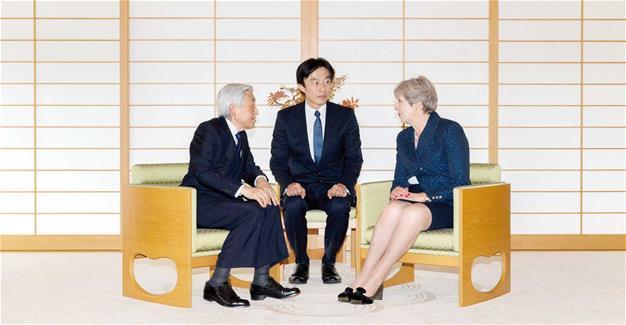UK PM May says EU repeal bill best way to avoid Brexit ‘cliff edge’
LONDON – Reuters
 Prime Minister Theresa May has warned lawmakers that Britain could be faced with a Brexit “cliff edge” if they failed to back her EU repeal bill, as reports suggested momentum was growing within her party to unseat her.
Prime Minister Theresa May has warned lawmakers that Britain could be faced with a Brexit “cliff edge” if they failed to back her EU repeal bill, as reports suggested momentum was growing within her party to unseat her.With British lawmakers readying for their first full parliamentary debate on the legislation that will sever the country’s ties with the European Union, the minister responsible for overseeing the divorce proceedings admitted on Sunday that some payments would continue to Brussels after Britain left.
May failed to win a clear mandate at a snap election in June and only has a slim majority in parliament that rests on an agreement with a smaller party. She remains vulnerable if pro-European lawmakers in her Conservative party team up with other parties to vote down legislation or support amendments.
In an Aug. 31 debate, the main opposition Labour Party is planning to propose several changes to the repeal bill with a view to keeping Britain in the single market and customs union during a Brexit transition period after 2019, according to The Times.
On Feb. 2, May’s deputy advised Conservative lawmakers against doing anything that would increase Labour’s chances of returning to power, while May said the bill was the best way to ensure a successful Brexit.
“[It is] the single most important step we can take to prevent a cliff-edge for people and businesses, because it transfers laws and provides legal continuity,” she said in comments provided by her office.
But in a move that would irk many Eurosceptics, the Sunday Times said May was preparing to pay a Brexit divorce bill of up to 50 billion pounds ($65 billion) to the EU. A spokeswoman at May’s office told Reuters the report, which cited an unnamed source “is simply not true.”
Britain’s chief Brexit negotiator, David Davis, also dismissed the 50 billion figure.
He did say Britain was likely to end up paying money into the EU budget after Brexit for access to cross-border schemes like space and nuclear research, though the sum would not be large over the medium to long-term.
Speaking to the BBC on Sept. 3, he criticized the EU Commission for trying to paint the talks in a negative light after last week’s third negotiating round ended with sharp criticism of the British approach.
“The commission puts itself in a silly position if it says nothing has been done,” he said, adding that Britain would not be forced by time pressure to act against its interests.
May tried last week to douse speculation over her leadership by saying she wanted to continue as prime minister beyond the next parliamentary election, not due until 2022, dismissing expectations she would quit as early as 2019.
















